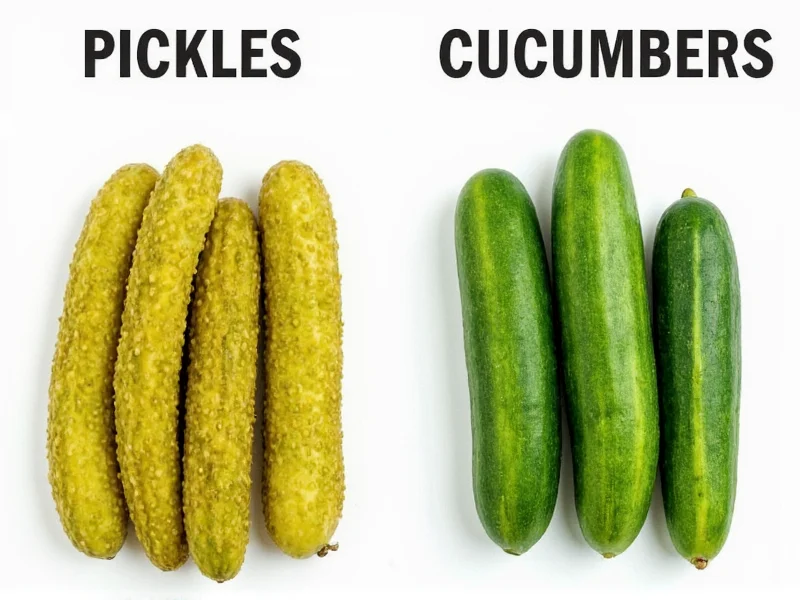Pickles are not a separate vegetable but rather cucumbers that have undergone a preservation process called pickling. All pickles start as cucumbers, but not all cucumbers become pickles. The key difference lies in the preparation method: cucumbers are fresh produce, while pickles are cucumbers preserved in a solution of vinegar, salt, and spices, which transforms their texture, flavor, and nutritional profile.
Understanding the distinction between pickles and cucumbers clears up one of the most common food misconceptions. Many people mistakenly believe pickles are a different vegetable entirely, but the reality is much simpler: pickles are cucumbers transformed through preservation. This fundamental relationship explains why you'll never find "pickle plants" growing in gardens—they're always cucumber plants.
The Fundamental Relationship Between Cucumbers and Pickles
Cucumbers (Cucumis sativus) are crisp, refreshing vegetables harvested fresh from vines. Pickles represent the same vegetable after undergoing a specific preservation technique. The term "pickle" refers to any vegetable or fruit that has been preserved through pickling, but in common usage, it specifically denotes pickled cucumbers.
When exploring how are pickles made from cucumbers, the process involves submerging cucumbers in a pickling solution. This solution typically contains vinegar, water, salt, and various spices like dill, garlic, or peppercorns. Through this transformation, cucumbers develop the characteristic tangy flavor and firmer texture we associate with pickles.
The Science Behind Pickling: From Cucumber to Pickle
Pickling works through two primary methods:
- Vinegar-based pickling: The most common commercial method where cucumbers are submerged in a vinegar solution, creating immediate preservation through acidity
- Fermentation pickling: A traditional method where cucumbers are submerged in a saltwater brine, allowing natural bacteria to convert sugars into lactic acid over time
During fermentation, beneficial bacteria (Lactobacillus) consume the natural sugars in cucumbers, producing lactic acid that preserves the vegetable while developing complex flavors. This process typically takes 1-6 weeks, depending on temperature and desired sourness.
Types of Cucumbers Used for Pickling
Not all cucumbers work equally well for pickling. Specialty varieties exist specifically for this purpose:
| Type of Cucumber | Characteristics | Best For |
|---|---|---|
| Pickling cucumbers | Shorter, thicker skin, fewer seeds, crisp texture | Traditional pickles, relish, bread and butter pickles |
| English cucumbers | Longer, thinner skin, minimal seeds | Slicing, fresh consumption (not ideal for pickling) |
| Kirby cucumbers | Bumpy skin, dense flesh, excellent crunch | Dill pickles, refrigerator pickles |
| Lemon cucumbers | Rounded shape, yellow color, mild flavor | Specialty pickles, decorative pickling |
When considering can you make pickles from any cucumber, the answer is technically yes, but results vary significantly. Standard slicing cucumbers often become mushy during pickling due to higher water content and thinner skins. Pickling-specific varieties maintain better texture and absorb flavors more effectively.
Nutritional Differences: Fresh Cucumbers vs. Pickles
The pickling process substantially alters the nutritional profile of cucumbers. Understanding difference in nutritional value between cucumbers and pickles reveals important dietary considerations:
- Sodium content: Pickles contain significantly more sodium (approximately 300-1,500mg per pickle) due to the brine, while fresh cucumbers have minimal sodium (about 2mg per 100g)
- Vitamin C: Fresh cucumbers retain more vitamin C, which degrades during the pickling process
- Probiotics: Naturally fermented pickles contain beneficial bacteria, offering potential gut health benefits not found in fresh cucumbers
- Calorie content: Both remain low-calorie options, though sweet pickles contain added sugars
For those interested in health benefits of pickles vs cucumbers, both offer hydration benefits, but pickles provide additional potential advantages from fermentation while introducing higher sodium levels that may concern some consumers.
Common Misconceptions About Pickles and Cucumbers
Several persistent myths surround the relationship between these two foods:
- Myth: Pickles are a different vegetable species than cucumbers
Fact: All pickles begin as cucumbers—there's no botanical difference in the starting material - Myth: "Pickling cucumbers" are a special species
Fact: They're simply cucumber varieties bred for optimal texture and flavor when pickled - Myth: The yellow color in some pickles comes from food coloring
Fact: Turmeric is commonly used as a natural coloring agent in many pickle varieties - Myth: All pickles are sour
Fact: Sweet pickles contain significant sugar, while bread and butter pickles offer a balanced sweet-sour profile
Practical Applications in Cooking and Nutrition
Understanding difference between pickling cucumbers and regular cucumbers helps home cooks and chefs make better ingredient choices. Fresh cucumbers excel in salads, gazpacho, and as refreshing snacks, while pickles serve as tangy condiments, sandwich additions, or standalone snacks.
For those exploring why are some cucumbers used for pickling, the answer lies in texture preservation. Pickling varieties maintain crispness better during preservation due to thicker skins and denser flesh. Attempting to pickle standard slicing cucumbers often results in softer, less appealing pickles.
When considering are pickles just cucumbers from a culinary perspective, the transformation through pickling creates an entirely different ingredient with unique properties. The preservation process develops new flavors, extends shelf life dramatically (from days to months), and creates different culinary applications.
Storage and Shelf Life Comparison
The preservation process fundamentally changes how these foods should be stored and their expected longevity:
- Fresh cucumbers: Last 1-2 weeks refrigerated, best consumed within days of purchase for optimal crispness
- Refrigerator pickles: Last 2-4 weeks refrigerated, made with vinegar but not processed for shelf stability
- Canned pickles: Last 1-2 years unopened at room temperature, maintain quality for 2-3 months after opening when refrigerated
Proper storage significantly impacts the texture and flavor experience, whether you're working with fresh cucumbers or various pickle preparations.











 浙公网安备
33010002000092号
浙公网安备
33010002000092号 浙B2-20120091-4
浙B2-20120091-4